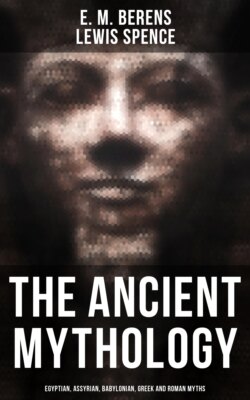Читать книгу The Ancient Mythology: Egyptian, Assyrian, Babylonian, Greek and Roman Myths - Lewis Spence - Страница 38
На сайте Литреса книга снята с продажи.
The Birth of the Gods
ОглавлениеBut there came a stirring in the darkness and the great gods arose. First came Lahmu and Lahame; and many epochs later, Ansar and Kisar, component parts of whose names signify 'Host of Heaven' and 'Host of Earth.' These latter names we may perhaps accept as symbolical of the spirits of heaven and of earth respectively. Many days afterward came forth their son Anu, god of the heavens.
At this point it should be explained that the name Tiawath affords a parallel to the expression T'hom or 'deep' of the Old Testament. Practically the same word is used in Assyrian in the form Tamtu, to signify the 'deep sea.'2 The reader will recall that it was upon the face of the deep that the spirit of God brooded, according to the first chapter of Genesis. The word and the idea which it contains are equally Semitic, but strangely enough it has an Akkadian origin. For the conception that the watery abyss was the source of all things originated with the worshippers of the sea-god Ea at Eridu. They termed the deep apsu, or a 'house of knowledge' wherein their tutelar god was supposed to have his dwelling, and this word was of Akkadian descent. This apsu, or 'abyss,' in virtue of the animistic ideas prevailing in early Akkadian times, had become personalized as a female who was regarded as the mother of Ea. She was known by another name as well as that of Apsu, for she was also entitled Zigarun, the 'heaven,' or the 'mother that has begotten heaven and earth'; and indeed she seems to have had a form or variant in which she was an earth-goddess as well. But it was not the existing earth or heaven that she represented in either of her forms, but the primeval abyss, out of which both of these were fashioned.
At this point the narrative exhibits numerous defects, and for a continuation of it we must apply to Damascius, the last of the Neoplatonists, who was born in Damascus about A.D. 480, and who is regarded by most Assyriologists as having had access to valuable written or traditional material. He was the author of a work entitled Doubts and Solutions of the First Principles, in which he states that Anu was followed by Bel (we retain the Babylonian form of the names rather than Damascius' Greek titles), and Ea the god of Eridu. "From Ea and Dawkina," he writes, "was born a son called Belos or Bel-Merodach, whom the Babylonians regarded as the creator of the world." From Damascius we can learn nothing further, and the defective character of the tablet does not permit us to proceed with any degree of certainty until we arrive at the name of Nudimmud, which appears to be simply a variant of the name of Ea. From obscure passages it may be generally gleaned that Tiawath and Apsu, once one, or rather originally representing the Babylonian and Akkadian forms of the deep, are now regarded as mates—Tiawath being the female and Apsu, once female, in this case the male. These have a son, Moumis or Mummu, a name which at one time seems to have been given to Tiawath, so that in these changes we may be able to trace the hand of the later mythographer, who, with less skill and greater levity than is to be found in most myths, has taken upon himself the responsibility of manufacturing three deities out of one. It may be that the scribe in question was well aware that his literary effort must square with and placate popular belief or popular prejudice, and in no era and at no time has priestly ingenuity been unequal to such a task, as is well evidenced by many myths which exhibit traces of late alteration. But in dwelling for a moment on this question, it is only just to the priesthood to admit that such changes did not always emanate from them, but were the work of poets and philosophers who, for æsthetic or rational reasons, took it upon themselves to recast the myths of their race according to the dictates of a nicer taste, or in the interests of 'reason.'
